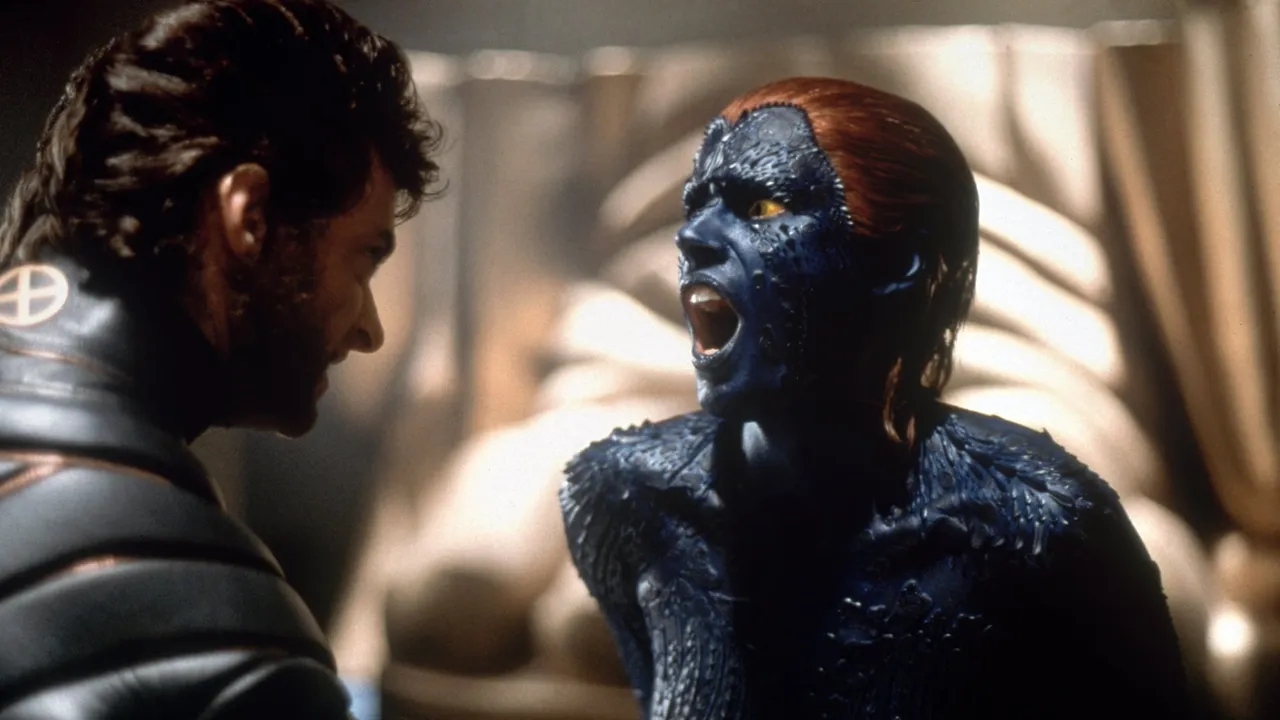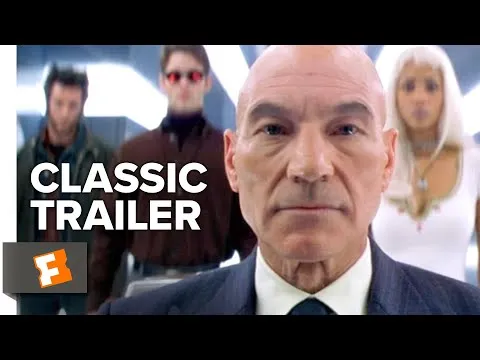
What appears to be formula for success in today’s Hollywood – insanely expensive superhero films connected into elaborate long-lasting cycles built on different franchise – wasn’t built overnight. There were many hiccups and experiments that didn’t end well, but someone had to make the first step and establish trend that lasts to this day. This honour belongs to Bryan Singer and his 2000 film X-Men, the very first summer blockbuster based on the Marvel Comics series.
The plot is set in near future when the world became aware that certain individuals within homo sapiens species have the genes that had made shortcut through evolutionary posses and, as a result, they have various superhuman powers. Ordinary humans are afraid that they would be abused or even replaced by the new kind of Übermensch and those fears are reflected in the campaign by Republican senator Robert Jefferson Kelly (played by Bruce Davison) who passed the law demanding all mutants to be registered. Magneto (played by Ian McKellen), elderly mutant with magnetic powers, is reminded of his childhood when he was imprisoned by Nazis for being different, and decides to wage the war of extermination against normal humans. His friend Professor X (played by Patrick Stewart), telepathic mutant, advocates peaceful coexistence and has founded the school in which young mutants are taught skills necessary to fit into the human society. Their different approaches escalate into open conflict when Magneto tries to use UN summit in New York City as an opportunity to artificially cause mutations within world leaders. He is aided by group of followers that include strong Sabretooth (played by Taylor Mane), Toad (played by Ray Park) with prehensile tounge, and shape-shifting woman named Mystique (played by Rebecca Romijn). Xavier must confront him with his own group that involves laser-eyed Cyclops (played by James Marsden), his girlfriend with telekinetic abilities Dr. Jane Grey (played by Famke Janssen) and atmospheric manipulator Storm (played by Hale Berry), together with two new recruits – claw-equipped immortal man named Wolverine (played by Hugh Jackman) and Rogue (played by Anna Paquin), teenager with ability to suck people’s life force and memories by touching them.
When X-Men went into production, Hollywood’s record of building film franchises around comic book superheroes was spotty. Only DC Comics had honour of having its property – Batman and Superman – turned into successful series, but both of those series have met rather unfortunate end. X-Men, based on the comic books that were relatively unknown beyond the realm of comic book geekdom, looked a risky proposition. Fortunately, director Bryan Singer, until that time best known for his critically acclaimed crime film The Usual Suspects, knew what he was doing. He correctly identified one of the major issues that would plague many superhero franchises in the future – need of the first film to provide origin story while not ignoring the “regular” plot. Problem, which is made more difficult with plenty of different but unique characters that make X-Men into ensemble piece, is solved through tight editing and quick pace, while the necessary exposition is given in economic and efficient way. Because of that, X-Men goes smoothly through 104 minutes of running time, which makes it unimaginably short for today’s standards of bloated superhero films.
Singer, which is even more important, manages to finds the proper balance between delivering visual attractions to audience and the building the proper story and characters. His scriptwriter David Hayter, like in the best comic book tradition, takes great pains to explain the origins of its main villain and even let audience understand his action and motives, at times making it not look like a villain at all. This also allows Singer to use X-Men as a political message. Singer, who is a Jewish and gay, draws not so subtle parallels between anti-Semitism that dominated Europe before Second World War and homophobic reactions to emerging gay rights movement in late 20th Century America, with mutants being seen as symbolic substitutes for all minorities persecuted over being “different”.
What makes X-Men worse than it could have been is the seriousness. There is very little humour in the film and most of the jokes are based on the references that could be understood only by hardcore fans of the original comic books. Impression is, on the other hand, improved by excellent and very diverse cast, ranging from Shakespearean giants like McKellen and Stewart to professional wrestler Taylor Mane and model Rebbeca Romijn, here almost unrecognisable under heavy makeup. Hugh Jackman stands out with his impressive portrayal of Wolverine (which would repeat in sequels and two standalone fims) and same can be said of Anna Paquin. On the other hand, motive of mutation-creating device looks less like an attempt to properly advance plot and more like an excuse for display of CGI special effects, which becomes annoying near the end of the film. X-Men was the risk that ultimately paid off. Film was enormous success at the box office, received good reviews and, more importantly, allowed franchise to continue through sequels, reboots, prequels and spin-offs, indirectly paving the way for behemoth that would be known as Marvel Cinematic Universe. For the better or worse, floodgates were open with this film.
RATING: 6/10 (++)
Blog in Croatian https://draxblog.com
Blog in English https://draxreview.wordpress.com/
Leofinance blog @drax.leo
Unstoppable Domains: https://unstoppabledomains.com/?ref=3fc23fc42c1b417
Hiveonboard: https://hiveonboard.com?ref=drax
Bitcoin Lightning HIVE donations: https://v4v.app/v1/lnurlp/qrcode/drax
Rising Star game: https://www.risingstargame.com?referrer=drax
1Inch: https://1inch.exchange/#/r/0x83823d8CCB74F828148258BB4457642124b1328e
BTC donations: 1EWxiMiP6iiG9rger3NuUSd6HByaxQWafG
ETH donations: 0xB305F144323b99e6f8b1d66f5D7DE78B498C32A7

